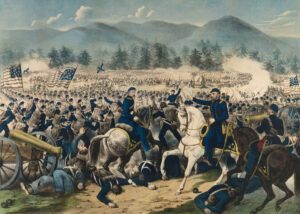Responses to The Confederacy: America’s Worst Idea
So many people insist on viewing the American Civil War (or any war, for that matter) from a good-guys-won perspective. It’s a sure way to obscure at least half the facts and distort the meaning of the rest. As long as Billy Yank is a hero and Johnny Reb a villain (or vice versa), the war is still going on in the hearts and minds of partisan researchers and history buffs. And in my opinion, the war can never be truly understood until it finally ends.
Patrick Carroll
Carver, Mn.
Two wrongs don’t make a right, and in this case, both the Union and the Confederacy were wrong.
Matthew Silber
Kansas City, Mo.
Of course the war of the rebellion was bad. The country is still suffering from that event. Yes it freed the slaves. What was gained in the 150 years since that war ? The Southern states were decimated by vengeful Union armies. The then-known rules of war were thrown away. The Southern states were an economic wreck. Possibly still are. Just look at the latest census data. The former Confederate States, The South, lead the poverty list. One might think the newly freed slaves could leave the area for greener pastures up North. But no, this was not possible either. Read the northern papers of the 1860s and 1870s. They are full of reports of freed slaves being turned away by farmers and tradesmen.
David Heinsohn
Longview, Tx.
McCurry offers a good analysis of resistance of women and slaves to the Confederacy. But no mention was made of the approximately 100,000 white males from the 11 officially-seceded states who fought for the Union. Or the approximately 250,000 white males from the border slave states (MO, KY, MD, DE), who also fought for the Union. These men were a loss to the Confederacy, and a gain to the Union. They represented the discontent, or outright hostility, toward the Confederate States of America that was manifest in parts of the south, especially in the Appalachians and the Ozarks.
Tony Robertson
Mexico, Mo.
Professor McCurry’s piece was thought-provoking and controversial. In attempting to refute the Lost Cause myth, she inevitably embraces another, the inevitability of Union and the progressiveness and benevolence of Federal policy. She takes the southern states to task for being “antidemocratic,” because the elections of delegates to the secession conventions excluded women and African-Americans. I’m sure Professor McCurry knows that women did not vote in any state in 1860 and African-Americans voted only in five New England states and New York in 1860. By her standard, President Lincoln’s election was “antidemocratic,” as was virtually every American election to that point. It was through conventions of the people, defined as white male voters, that the Constitution itself adopted. If “democracy” is the standard by which we are to judge, we would do well to remember that there is something vaguely antidemocratic about killing 265,000 of one’s own citizens and ejecting by military force eleven elected state governments and replacing them with eleven military governors, then disfranchising the majority of the voters of those states as they drafted new constitutions. Yet these were the inevitable consequences of the decision to oppose secession by military force. The fissures in southern society were exposed by the war, not by secession, regardless of how democratic the secession decision was, so perhaps the opposing secession through military power was America’s worst idea. As John Randolph of Roanoke said, “It was always my opinion that Union was the means of securing the safety, liberty, and welfare of the confederacy, and not in itself an end to which these should be sacrificed.”
D. Jonathan White
Military History Instructor
Virginia Polytechnic Institute and State University
Blacksburg, Va.
I read Professor McCurry’s interesting article about the Confederacy and the “noble lost cause.” In my view, the appropriate words to use in describing the enslavement of one group of human beings by another group is that the slave owners and their government were amoral and evil beings. There are no excuses for this behavior and attitude.
The Confederacy lost the Civil War, and Lincoln is to be honored by this country for saving it and having the guts to persevere to its conclusion.
It is also a tragedy it took another 100 years for the wrongs and horrors of segregation and loss of basic human rights to be corrected during the Johnson administration.
Michael C. St. Vrain
Luebbering, Mo.
Thank you for the article on the Confederacy. An excellent read for those interested the Civil War is the “The Outbreak of The Rebellion” by John G. Nicolay, private secretary to President Lincoln. The original 1881 book might be in reprint.
Carl Vandewinckel
Williamson, NY
On page 30 of your December article on “The Confederacy” you exhibit a fairly well-known picture of Charles Syphax who was a slave at Arlington before the Civil War. You state that Arlington was the property of Robert E. Lee but although after his marriage Lee made it his home, Arlington belonged first to G.W.P.Custis and then to his daughter Mary Anna Randolph Custis (Mrs. R.E.Lee). Sadly, Lee himself never owned a single piece of property in his entire life. In addition, you identify the child Mr. Syphax is holding as Lee’s grandson William. But according to Elizabeth Brown Pryor in her book Reading the Man: A Portrait of Robert E. Lee Through His Private Letters, (p. 139) the grandchild was Mr. Syphax’s. She includes this image in her book to suggest how intimately whites and blacks lived together at the time since the child looks entirely white, the undoubted result of intercourse between slave and master. Pryor remarks that “there is no evidence that Lee himself indulged in sexual activity with the slaves” though he was aware of its taking place on his father-in-law’s estate. Finally, Lee did have a grandson who was born during the War but his name was Robert E. Lee III and he died soon after his birth.
Dr. Judith Farr
Professor of English & American Literature Emerita
Georgetown University
Washington, D.C.




